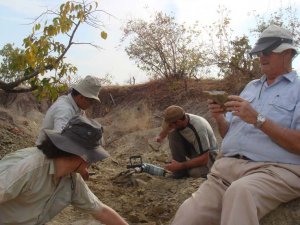
Researchers agree that our immediate ancestors, the upright walking apes, arose in Africa. But the discovery of a new primate that lived about 37 million years ago in the ancient swamplands of Myanmar bolsters the idea that the deep primate family tree that gave rise to humans is rooted in Asia. If true, the discovery suggests that the ancestors of all monkeys, apes, and humans—known as the anthropoids—arose in Asia and made the arduous journey to the island continent of Africa almost 40 million years ago.
Until 18 years ago, fossils of every suspected early anthropoid were found in Egypt and dated to about 30 million years ago. Then, starting in the 1990s, researchers began discovering the remains of petite primates that lived 37 million to 45 million years ago in China, Myanmar, and other Asian nations. This suggested that anthropoids may have actually arisen in Asia and then migrated to Africa a few million years later. But paleontologists have lacked the fossils to show when and how these anthropoids trekked from Asia to Africa, says paleontologist K. Christopher Beard of the Carnegie Museum of Natural History in Pittsburgh, Pennsylvania.
But don’t panic, you can still retain your “We are all Africans” Tee-shirt because the immediate ancestor of all humans alive today did indeed arise in Africa, that has not changed.
What has triggered this latest story is a paper that describes a fossil primate from the late middle Eocene Pondaung Formation of Myanmar that is remarkably similar to, yet dentally more primitive than, the roughly contemporaneous North African anthropoid Afrotarsius.
You can access that paper here … “Late Middle Eocene primate from Myanmar and the initial anthropoid colonization of Africa” – Proceedings of the National Academy of Sciences, June 4, 2012
The Carnegie Museum of Natural History also has a press release on all this here, and Primatology.net also has an article here.